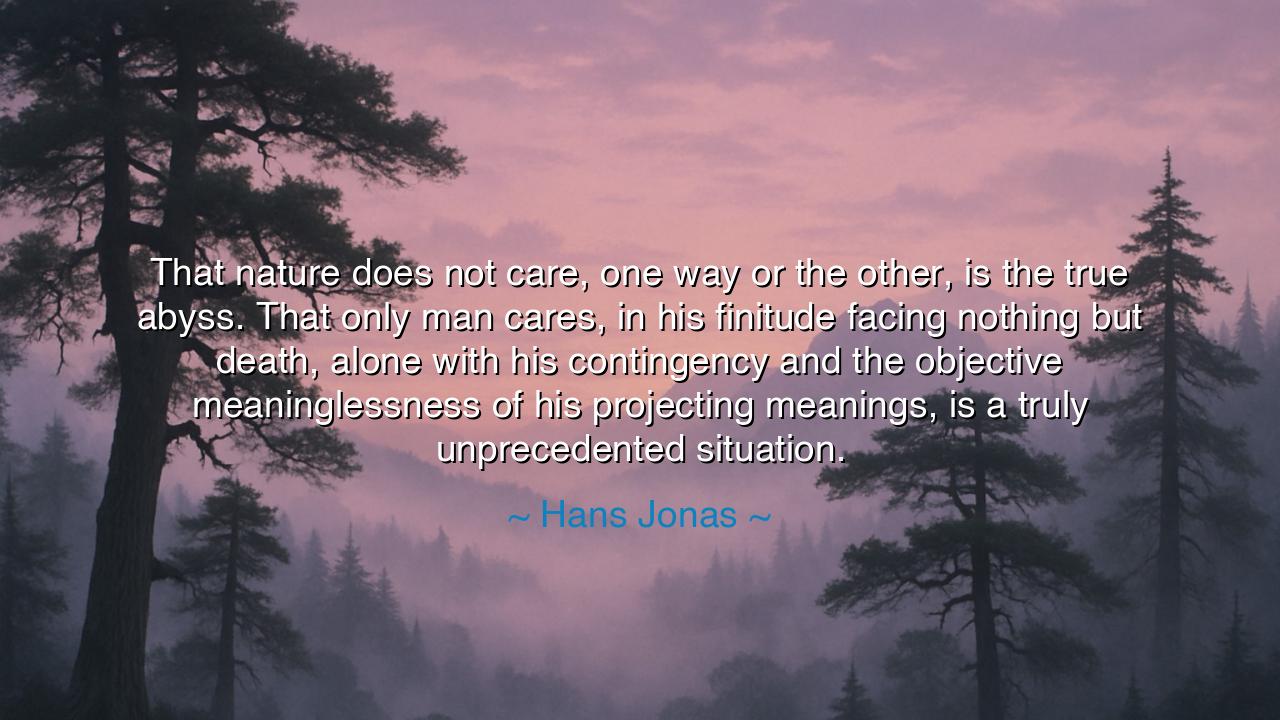
That nature does not care, one way or the other, is the true
That nature does not care, one way or the other, is the true abyss. That only man cares, in his finitude facing nothing but death, alone with his contingency and the objective meaninglessness of his projecting meanings, is a truly unprecedented situation.






“That nature does not care, one way or the other, is the true abyss. That only man cares, in his finitude facing nothing but death, alone with his contingency and the objective meaninglessness of his projecting meanings, is a truly unprecedented situation.” — thus spoke Hans Jonas, the philosopher who gazed into the cold silence of modernity and refused to look away. In this quote, he lays bare the existential chasm between man and the universe: the vast, indifferent cosmos that neither judges nor comforts, and the fragile human spirit that longs for purpose amid its indifference. Here lies the abyss — not in death itself, nor in suffering, but in the revelation that nature is indifferent, that the stars burn not for us, and that the earth rolls on whether we live or die.
For millennia, humanity believed that the heavens cared — that the gods guided destiny, that storms were messages, that the order of the world mirrored the moral order of the soul. But in the age of reason and science, that ancient faith began to crack. The cosmos was revealed not as a kingdom ruled by spirit, but as an expanse of silence, governed by laws yet deaf to human longing. It was this realization — not war, not loss, but cosmic indifference — that Jonas called the “true abyss.” To stand before the night sky and know that it neither pities nor condemns is to feel the chill of our own finitude, to understand that meaning is not found in the stars but made by the heart.
Hans Jonas wrote in the shadow of the 20th century, when the horrors of war, genocide, and technological domination stripped man of his illusions. He had witnessed how modern man, armed with science but emptied of faith, could unleash destruction without remorse. From this, he learned a terrifying truth: when the world ceases to be sacred, when nature becomes mere mechanism, morality must be born anew within the soul. If nature does not care, then man must — for there is no one else who will. To recognize the world’s indifference is not to surrender, but to awaken to our moral responsibility within it.
Consider the story of Viktor Frankl, the psychiatrist who survived the Nazi camps. Surrounded by death and stripped of all earthly meaning, he discovered what Jonas described: that the universe is silent, but that man’s capacity to care is what redeems that silence. Frankl wrote, “Those who have a ‘why’ to live can bear almost any ‘how.’” He found that even when everything external was taken — food, safety, freedom — the soul could still choose its stance. In the face of indifference, to love, to hope, to believe in meaning despite meaninglessness, became the act of defiance that preserved humanity itself.
Thus, when Jonas says that man is “alone with his contingency,” he speaks of the courage to exist without divine reassurance. We are finite beings, aware that we will die, yet capable of creating value in a valueless cosmos. The animals live and die untroubled; the stars burn without awareness; but man alone bears the terrible gift of consciousness — the knowledge of his own mortality and the yearning to make his brief spark matter. It is a burden, yes, but also a sacred calling. For meaning is not given from above; it is born from the depths of care, from the trembling insistence that even in an uncaring universe, our actions can still be good, beautiful, and just.
There is a strange nobility in this condition. To stand before the void and still choose compassion; to know that the world will forget us and still create art, raise children, build cities, and love — this is man’s heroic rebellion. The ancients sought immortality in the favor of gods; the modern soul finds it in the courage to love in spite of death. Jonas’s words remind us that our greatness lies not in being cared for, but in caring nonetheless. The coldness of the universe becomes the forge in which the human spirit is tempered, where empathy, purpose, and conscience become acts of creation as divine as any miracle.
The lesson, then, is both solemn and luminous: do not despair at nature’s silence. Do not curse the void for its indifference. Instead, fill it with meaning of your own making. Care — even when the world does not. Build kindness into the machinery of a world that offers none. Live as if your life, fleeting and fragile though it is, bears infinite worth — for it does, because you choose that it does. Let your compassion defy the stars, your love outshine the darkness, your actions declare: “Though the universe may not care, I will.”
And perhaps, in that act of defiance — that luminous resolve — we glimpse the true destiny of humankind: to be the voice of care in a silent cosmos, to write mercy upon the indifferent earth, and to transform the abyss itself into a place where meaning can dwell. For even in the cold vastness, there is one warmth that endures — the fire of the human spirit, undaunted, unbroken, forever saying: I care.






AAdministratorAdministrator
Welcome, honored guests. Please leave a comment, we will respond soon